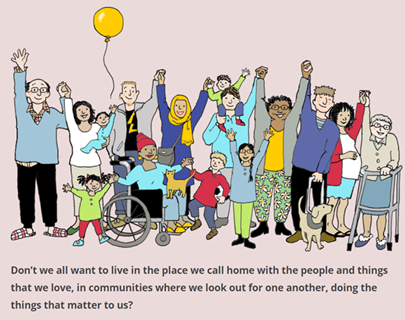TTA has an open invitation to industry leaders to contribute to our Perspectives non-promotional opinion area. Today, we have a contribution from Adrian Scaife, Global Product Manager at Tunstall Healthcare Group. Can telecare save the UK more than £14bn over the next 10 years, as FarrPoint projected–or is that an underestimate based on the past? Can we do better than this?
Interested contributors should contact Editor Donna. (We like pictures and graphs too)
FarrPoint recently published a report showing how extending telecare services to more people could save the UK more than £14bn over the next decade. While £14bn is no small sum, it is based on the evidence of hindsight and importantly through current models of reactive service provision.
In a LinkedIn post I boldly suggested that this should be an underestimate of the benefits that Technology-Enabled Care, associated with a wider transformation of care, could deliver over the next decade.
With increasing demand for care and support combined with finite resources for provision, the statutory care system is facing a perfect storm. The cracks have been appearing for some time but have become apparent to a much wider audience during the Covid pandemic. To be blunt, the current model of care provision is unsustainable in the medium term. (And many would argue today!)
By moving to more preventative, personalised, joined up and proactive service models, supported by communities as well as statutory services, the benefits are potentially much bigger across the whole care ecosystem. (The care ecosystem includes health care, social care, housing, the third sector and, the largest group of all, informal family carers.)
 Source: Social Care Future
Source: Social Care Future
This new vision is being discussed by many people and organisations across the care ecosystem and has been referenced, in whole or part, in a host of reports over the last couple of years. What is most encouraging is the consensus around the direction of travel.
The real challenge is the transformation of services from purely reactive, one size fits all, to a preventative and person-centred approach across housing, social care, health care, and the third sector, supported by families, friends, and communities, while still retaining a reactive safety net.
There are important questions around the how? Enabling and underpinning these new service models will be technology using data, information, and actionable insight. New technology has already created dramatic changes in many other sectors across the UK. There is a huge demand for a new set of tools that can, for example, flag everything is OK today or when an early intervention may be required. These tools will work on an individual personalised basis and all the way up to the population level. Joining up data and using insight provided by analytics will enable new high value timely personalised interventions and provide improved outcomes for all stakeholders.
The good news is that there are a huge variety of companies already working on these challenges from start-ups to SME’s, larger companies, and even global players. The real challenge will be around people (e.g., new working practices) and processes (e.g., new models of commissioning), and of course, culture. Part of the new story will be about enabling working across all stakeholder groups and indeed recognising families as equal partners.
Finally, this is not a transformation that will take place overnight or even within a year but a journey that will take five or more years before it reaches any type of maturity. The green shoots already exist if you look for them, they may be a little tender and frost sensitive, but they are growing! It reminds me of the early telecare journey in the late 90s and early 00s when many could not see how it would scale to where we are today!
While £14bn from traditional reactive services would be welcome, the real opportunity for improved outcomes for all stakeholders across the care system is much greater and not just in an economic context. Personally, I am enormously excited to be playing a part in enabling those tender shoots to grow, thrive, and become the norm over the next few years.
Further reading:
- The Independent Review of Adult Social Care in Scotland led by Derek Feeley
- Transforming care and support Social Care Institute of Excellence
- How can technology be truly integrated into adult social care? The joint ADASS TSA Commission findings and recommendations
- Technology for our Ageing Population: Panel for Innovation (TAPPI) Dunhill Medical Trust and partners
- Social Care Future
- Integrated care systems and social care: the opportunities and challenges Kings Fund








Most Recent Comments